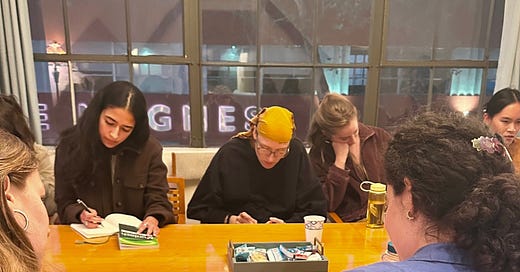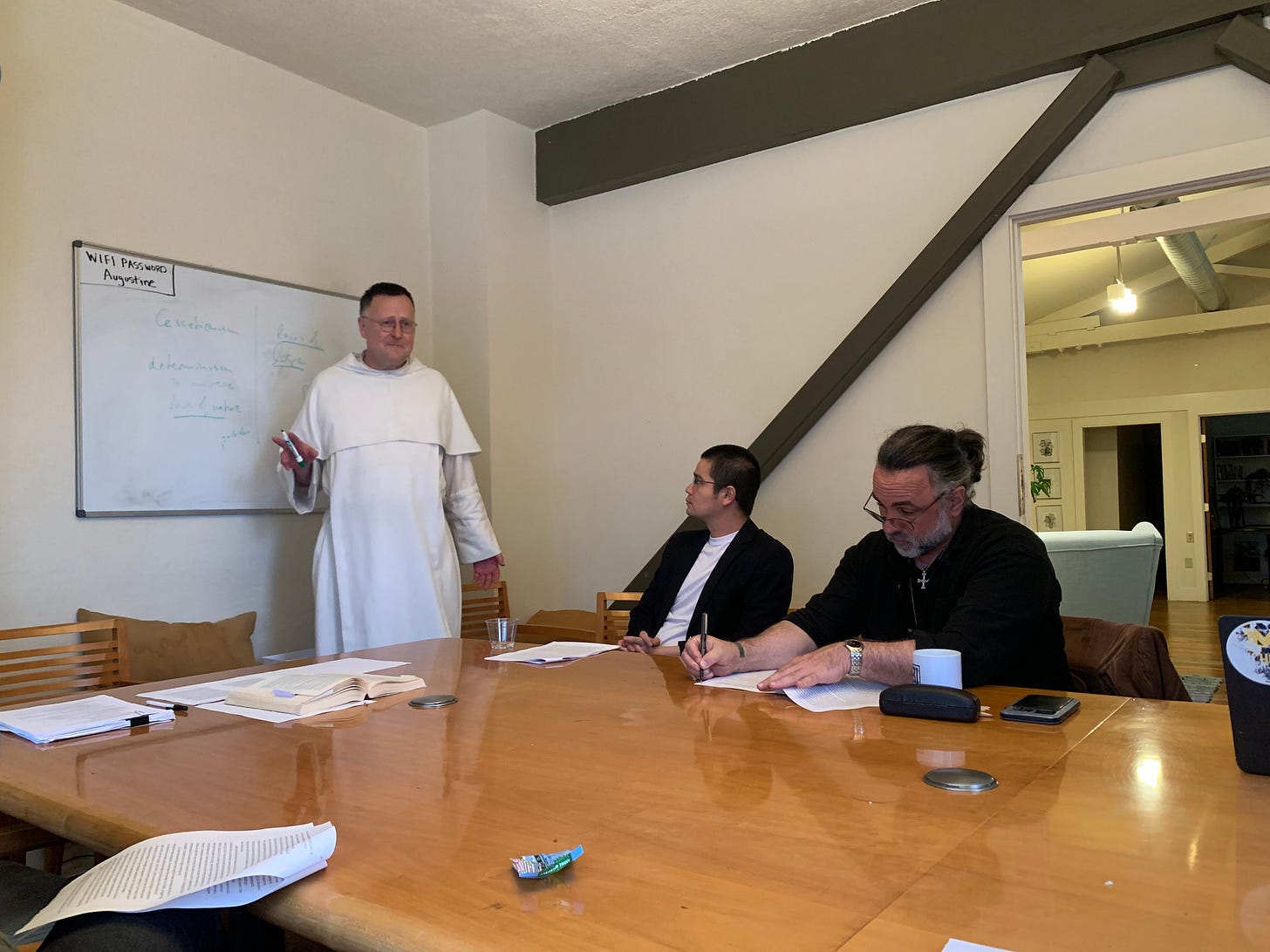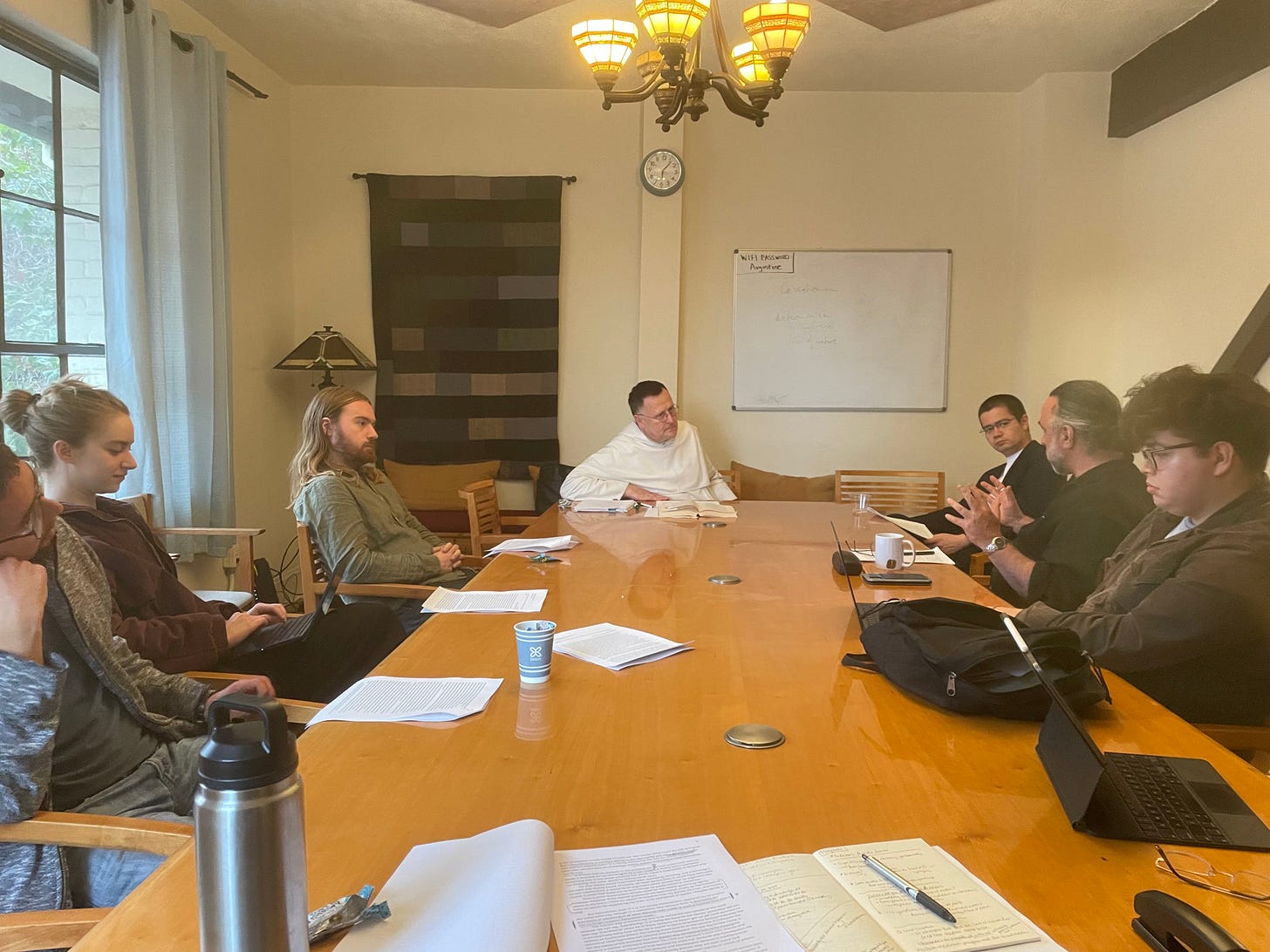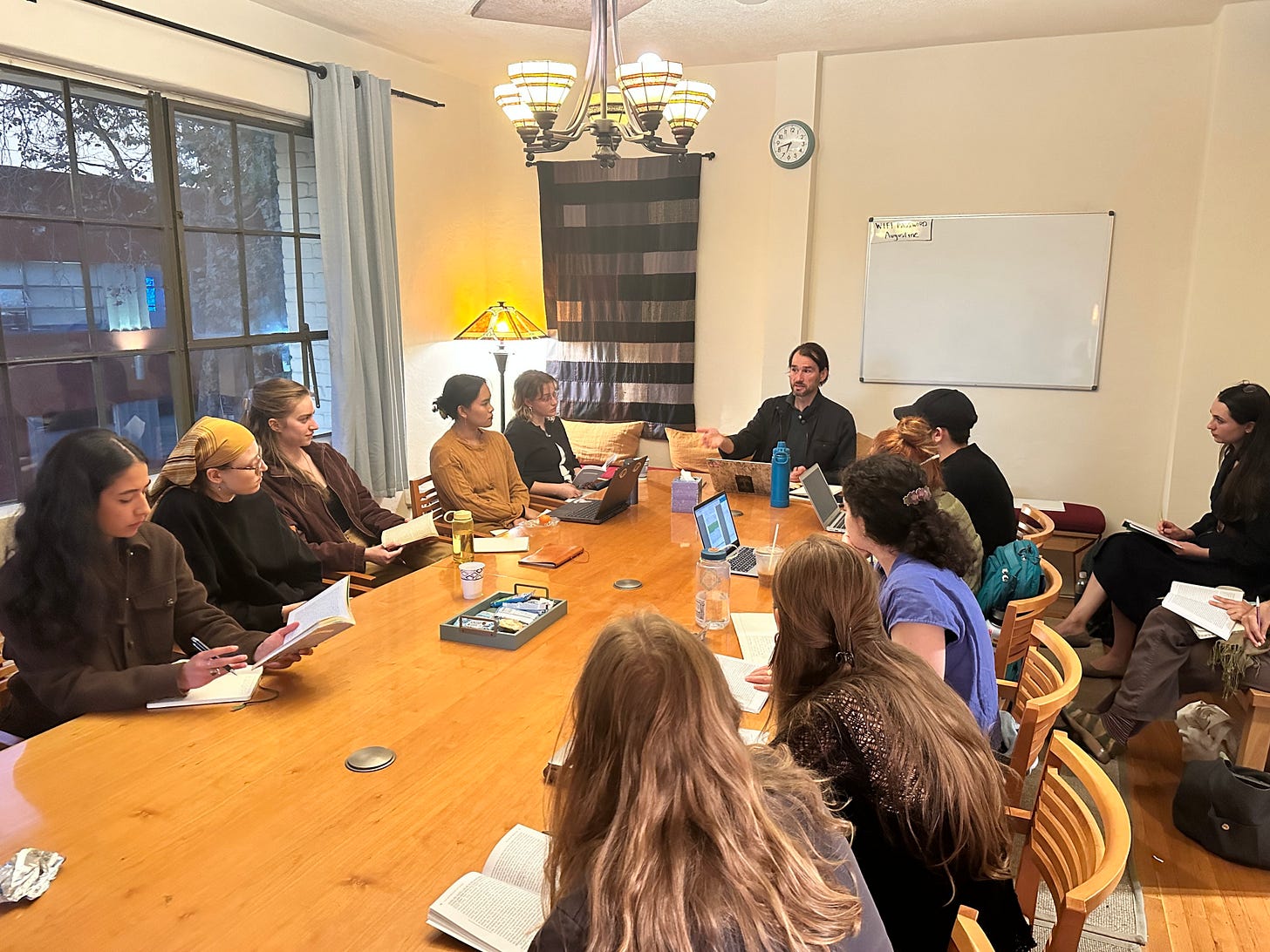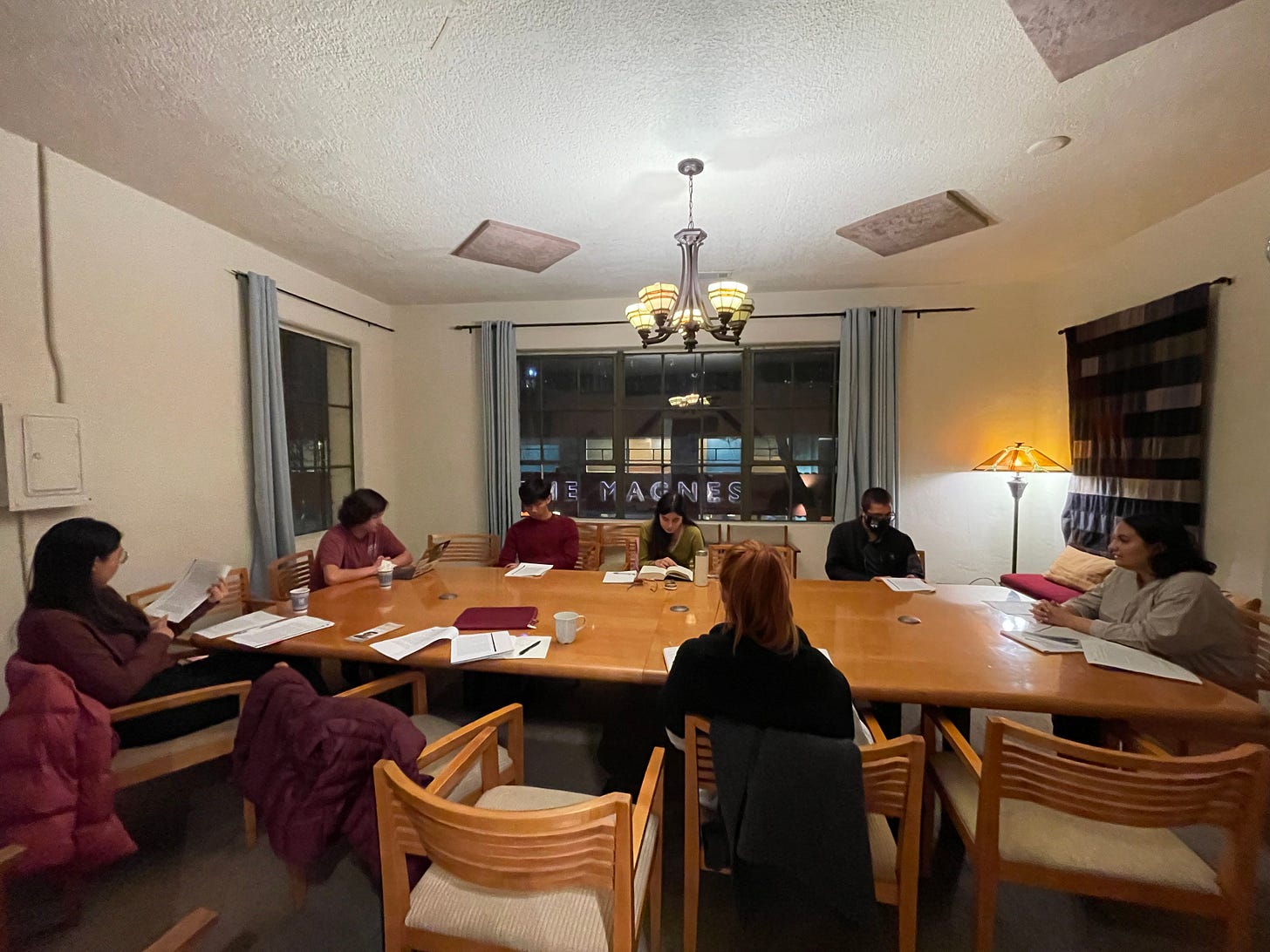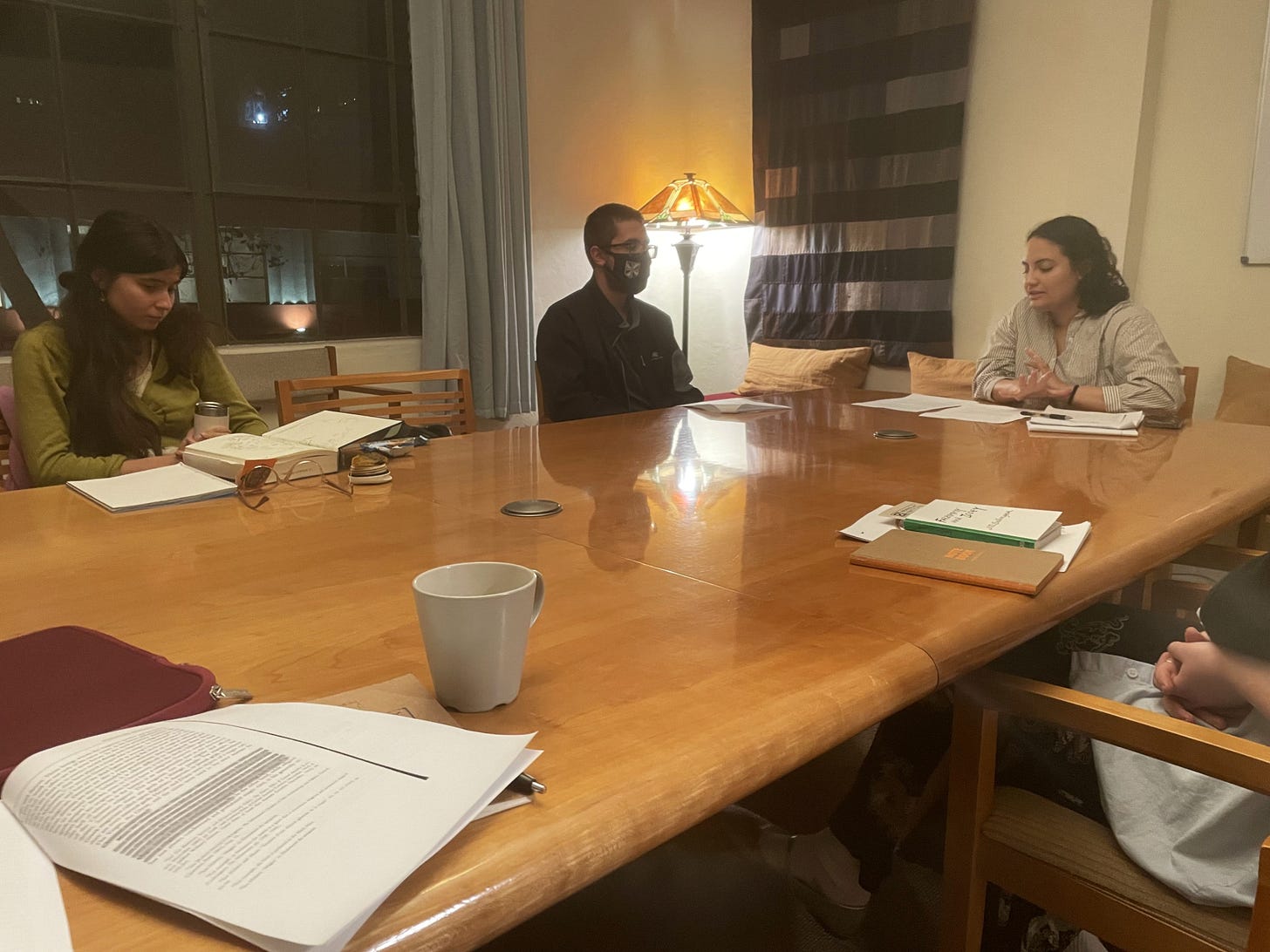Our Fall 2024 Seminars
Miracles, attention, and the task of defining religion — and other things we're still thinking about
Thinking with the Berkeley Institute is a venue to share the programming, ideas, and conversations of the Berkeley Institute with our larger community. Below, you can read about three seminars we hosted this fall, under our Fall 2024 theme “Religious Life and the University” — “Is it Rational to Believe in Miracles?”; “Iris Murdoch’s Ethics of Attention”; and “On the Social Study of the Sacred.” Read below to hear about the questions they asked, the frameworks they provided, and what we’re still thinking about.
Our Fall 2024 matching campaign ends on Dec. 17th! All new and increased donations will be matched. Please consider supporting the Berkeley Institute today here — which allows us to continue to bring these kinds of conversations, free of charge, to students.
Is It Rational to Believe in Miracles?
Facilitated by Professor Anselm Ramelow, O.P.
Seminar description: Can we study science at a modern university and believe in miracles at the same time? Modern people, including believers, can be embarrassed by miracles, fearing to be accused of superstition or unwarranted credulity. Can it be ever rational to believe in miracles? We will read two texts, considering questions such as: What are miracles? Can they violate laws of nature? How can we know that they have occurred? What do they tell us about God, about the world and ourselves?
What we’re still thinking about: Professor Ramelow started off this two week seminar by posing that “before we look at the actuality of miracles, we have to look at the possibility of miracles.” In the first session, we spent time setting the distinction between “how do we know” and “is it possible.” That is, before we allow ourselves to say that we know a relic has healing capabilities, for example, because a person was healed by them, we must first ask ourselves, “is it possible?”
We asked if a miracle is something that acts against a law of nature, but C.S. Lewis writes in his book, Miracles, that an exception to a law is not a miracle – that it is not a supernatural event but instead what he calls a “subnatural” event. Thus, we found that a miracle is more likely to be a temporary suspension of the law of nature by a higher power. Yet we established that even in the case of miracles, reasoning and rationality is important for, as C.S. Lewis also writes, “All possible knowledge, then, depends on the validity of reasoning.”
In the second session we asked about the actuality of miracles. Session one helped us see that miracles must be possible because the denial of them presupposes their possibility. But what about their actuality?
We discussed that new evidence is not contradicted by old laws of nature, and that it is possible to change your paradigm based on new observations. In his article, “Not a Miracle: Our Knowledge of God’s Signs and Wonders,” Professor Anselm writes about miracles and paradigms: “The old evidence will not contradict the new paradigm. Rather, it is suddenly evident what the evidence has meant all along… Having come to know God as someone who reveals himself in extraordinary events in history would not have led the apostles to disbelieve in a God who orders the ordinary course of nature according to predictable laws. In fact, it is the same care that leads God to reveal himself and to provide for us laws of nature that make our environment sufficiently predictable and intelligible.”
Thank you Professor Anselm for giving us these intellectually satisfying ways to dwell on the overlap between rationality and belief, between observation and faith, and for offering to our semester theme “Religious Life and the University” by showing that intellectual and scientific rigor does not preclude faith in a higher power, nor vice versa.
Iris Murdoch’s Ethics of Attention
Facilitated by Professor David Marno
Seminar Description: Iris Murdoch’s philosophy is the most influential modern defense of the view that the beautiful and the good are ultimately one. Or, perhaps a better way to put it is that in her account, acts of attending to beauty contribute to moral improvement. In fact, these two descriptions might be seen as different interpretations of Murdoch’s work, with the first focusing on the role of moral realism in her theory and the second invested in the question of practice and particularity. In this seminar, we’ll talk about the relationship between these two interpretations. What is the good and how does it relate to the beautiful? How do we motivate ourselves to be better, and how do we translate our moral ideals into practice? What is the role of literature and the arts in Murdoch theory, and how do they compare to religion? And, last but not least, what do we, distracted habitants of the 21st century, make of the emphasis she places on attention?
What we’re still thinking about: An English Department student reflected after this seminar series that “Iris Murdoch sees realism as ethical, which has ramifications for analyzing novels as well as thinking more generally about the ethical importance of seeing ourselves and others clearly.”
Through her philosophy, Murdoch attempts to bring back the moral significance of vision. She appreciates the power of a technique like prayer, but asks in The Sovereignty of Good, “What becomes of such a technique in a world without God, and can it be transformed” to suit the moral life of a non-religious person? Seeing reality for Murdoch is crucial for making the right ethical choice, and this correct “seeing” can be practiced through looking at what she calls “great art” – people like Shakespeare and Titian – as our seminar participant reflected above.
Reflecting on this event in light of our semester theme “Religious Life and the University,” we continue to ask ourselves: “Is it possible to access the religious life through university education? Can religious traditions enrich both our learning experiences and moral lives without our necessarily being attached to those traditions?”
Thank you Professor David Marno for bringing Murdoch to the Berkeley Institute and puzzling with us through her philosophical thought experiment of so-called “practical mysticism.”
On the Social Study of the Sacred
Facilitated by Dr. Monica Mikhail
Seminar description: How do social scientists recognize the “sacred” and make it legible to others? What are the essential characteristics of religion for social scientists? And how does a particular mode of inquiry shape the arguments one can make about religion and the religious life? In this seminar, we will explore these questions by discussing two distinct sociological and philosophical frameworks for understanding religious experience. We will read excerpts from two foundational figures in the study of religion — Emile Durkheim and William James — and explore how the sacred is defined, categorized, and apprehended according to their respective disciplines.
What we’re still thinking about: This seminar brought together readings from two foundational scholars of religion — an excerpt from The Elementary Forms of Religious Life by Emile Durkheim and an excerpt from The Varieties of Religious Experience by William James. In each of the readings, they take on the difficult task of articulating the contours of the study of religion within their disciplines.
Durkheim identifies for us certain “prejudices” that have formed our idea of religion and threaten a true understanding of religious life. In the first session, we discussed how Durkheim quite carefully considers the challenges of identifying certain aspects of religion as its “defining features” (e.g. supernatural, mystery, deity) and the formula he provides for accounting for religious phenomena. With the belief that “religious conceptions aim above all to express and explain not what is exceptional and abnormal but what is constant and regular,” Durkheim offers an account of religion that is primarily expressed through the collective and is rooted in the social and material conditions of life.
How about the parts of religious life that do not find their expression in the collective? In the second session, we discussed how William James attempts to rehabilitate the value of subjective experiences of religion by threading the needle between the disciplines of philosophy and psychology. He offers a broad definition of religious experience ultimately centered around the individual and their experience with the divine, positing that personal religion is a sufficient means to understanding any religion.
With our semester theme of the “Religious Life and the University” in mind, this seminar encourages us to continue to ask: how does a particular mode of inquiry shape the arguments one can make about religion and religious life? And how can disciplinary knowledge about religion enrich our understanding of our deepest commitments?
Thank you, Dr. Monica Mikhail, for helping us better recognize and utilize the implicit frameworks that guide the study of the sacred within the university — and, in such, gathering up many of the conversations we’ve had this semester. And thank you for directing our semester’s programming as the Berkeley Institute’s Director of Academic Programs!


